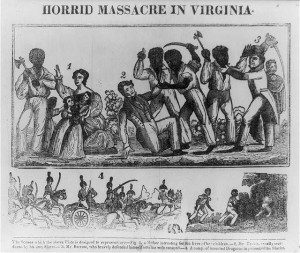A few months ago, I went to Harper’s Ferry with my wife and daughter. It’s a very odd National Historical Park because the National Park Service clearly does not know how to interpret John Brown’s life. Of course, it would be impossible to interpret John Brown’s life without antagonizing some potential visitors. Was he a deranged madman? Righteous avenger? Terrorist? All of those?
Recently, the National Museum of African American History put Nat Turner’s Bible on display. As detailed in this article, a Southampton County, Virginia, family donated the item after a family member became concerned about its deteriorating state. Curator Rex Ellis went to investigate:
Porter’s mother brought out a bundle from the closet wrapped in an old dish towel, which Ellis said seemed to be as old as the Bible. She also said something that struck him; that the family knew that the Bible was important because “there was so much blood on it.” He realized that it could be authentic.
“All that excited me no end,” Ellis said. “I couldn’t wait to bring it back” to Washington for testing.
For Maurice Person, the Bible’s owner and Porter’s stepfather, the Bible created more complicated feelings. In an interview, he recalled the family story about his great-great-grandmother, Lavinia Francis, who was a young child at the time of the Turner raid.
“She was home one day, except for the servants,” said Person. “They got word that the Nat Turner group was approaching the house. The servants took her upstairs and hid her in a cubbyhole. That’s why I’m here today.”
Turner was tried and hanged. Slave owners killed more than 100, and possibly close to 200, black people in revenge.
The Bible is temporarily on display in the National Museum of American History. The family who preserved it was white and kept the artifact despite the fact that an ancestor only narrowly escaped during the uprising. The family acquired the Bible when an ancestor cleaned out the county courthouse’s basement.
Like Harpers Ferry, this historical artifact will likely generate mixed feelings, as the article suggests:
Nat Turner is a revered figure to many African-Americans, a tangible example of someone who defied slavery’s shackles.
He was a slave who could read and write, an early rebel who, inspired by Scripture, led a bloody rebellion against whites in southern Virginia in 1831.
But to the white families once targeted by Turner’s band of slaves and freed blacks, he remains something altogether different, akin to today’s terrorists, responsible for the killing of more than 50 people, including women and children.
Christians should hesitate before applauding those who brutally killed people. At the same time, I think we should hesitate before condemning Christians with the rare courage to willingly offer their own lives in an attempt to strike a blow against what seemed an implacable evil.












